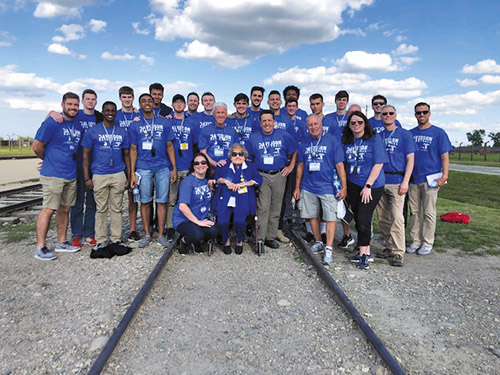
When Graham Honaker and Jerry Logan set out to write a book highlighting positive stories of a side of college basketball that often gets lost amid the competitiveness and scandal, they found one story that was so special and poignant that it stood out.
That story in “Unbracketed: Big Time College Basketball Done the Right Way” centered on the 2018 trip taken by the Davidson College Men’s Basketball Team and its coach, Bob McKillop, to visit Auschwitz accompanied by survivor Eva Mozes Kor, z”l, who had arrived at the camp as a 10-year-old with her twin sister, Miriam, and became the victim of the diabolical Dr. Josef Mengele during his infamous experimentation on twins.
“A big motivation for Jerry and me is that we hear so many bad things about college athletics, about the competitiveness and the cheating, but there are so many good stories and we wanted to showcase those stories, the most powerful of which was Davidson’s trip to Auschwitz,” said Honaker, who appeared with Logan during a November 7 program at Marlboro Jewish Center-Congregation Ohev Shalom (MJC) commemorating Kristallnacht.

The program was co-sponsored by the Maimonides Institute for Medicine, Ethics and the Holocaust (MIMEH), in partnership with the University of Southern California Shoah Foundation and the Jewish Federation in the Heart of New Jersey.
McKillop said that several years prior to accompanying his team he had been to the Polish death camp and knew what a powerful experience seeing the gas chambers, piles of human hair and shoes could be when viewed in person.
A former history teacher, he told the gathering, “I knew the history, but to see the stark reality up close is so moving.”
The trip and a 17-minute movie featuring players and coaches that was also shown were arranged by MIMEH founder and director Dr. Stacy Gallin, an MJC member, and Dr. Amanda Caleb, MIMEH’s educational consultant, professor of medical humanities at Geisinger Commonwealth School of Medicine, and an alumna of Davidson.

McKillop, the son of a New York City cop who spent his early years in Queens, recalled walking with his father as a child on his beat, an area made up of mostly Blacks and Jews, as his dad engaged in friendly conversation with residents. He left the city, which he described as “the holy land” on a college scholarship, remaining in North Carolina and ending up as coach at Davidson, recently retiring after 33 years leading the team.
When Caleb called and asked if he wanted to take his team to Auschwitz together with Kor, it presented a chance for his players to experience the same emotions he had.
Standing with the players as Kor described her experiences, he thought about what it must have been like for a 10-year-old child holding hands with her sister stepping off a train as soldiers shouted orders at them and dogs barked.
Despite the degradation and horror she endured, McKillop said they were impressed with the strength, dignity, forgiveness and integrity she displayed even as they walked along paths she had trudged many times as a child prisoner.
“How this woman has the capacity to smile in that environment after what she had been through, to say she forgives—what a message for our players,” McKillop shared. “She lost her parents, lost her sister and had her youth taken from her. And with everything taken from the Jewish people, she forgives. She is a hero.”
The effect she had on the players was evident.
“I think something changed for our team right after,” he said, adding, “I think it is important for these young men to have that experience because they will try and make sure that it never happens again.”
During the four-day trip players interviewed in the film described themselves as intrigued; they expressed shock at how dehumanizing conditions were and horror at how the Nazis could bring themselves to treat other human beings so terribly. One player said it made him “step back and realize the world doesn’t revolve around us.” Others commented it helped them appreciate what they have or helped them see what it was like to walk in another person’s shoes.
One player said he actually was nauseated seeing the piles of hair, while still another said that as he gazed up at the fixtures where the deadly gas came out, he realized it was probably the last thing some victims saw.
The rapport built between players and Kor was evident as they helped her push her walker and spoke of their admiration. At one point she is seen shaking her fists and yelling, “Go Wildcats,” the team’s name. Sadly, Kor died on July 4, 2019, exactly one year to the day after the trip, at the age of 85.
Gallin said from the first time she met Kor she promised the aging survivor she would continue to tell her story to the world, noting, “I take that promise very seriously.”
She added she was the only Jewish person among the panelists answering carefully crafted questions posed by Rabbi Michael Pont, yet none hesitated to travel and be part of the program, including McKillop, whose son, Matt, was debuting that night as Davidson’s new head coach.
“It makes me feel a lot better about the state of the world and Eva’s legacy,” said Gallin, while Caleb emphasized the trip and players’ reactions are a reminder of what should be important: respect for others.
By Debra Rubin










